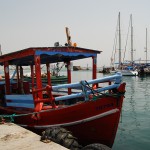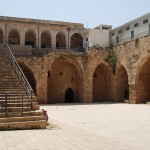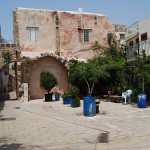City of Akko (Israel)
In Israel, on the coast of the Mediterranean sea in the West Galilee, there is an ancient city of Akko (Acre) – as a monument of architecture and history, which is included into the UNESCO’s list of the World Heritage Sites. According to some archeologists, the city is over four thousand years old.
The location of the city on the crossing of roads and its convenient harbours made it one of the most important ports of the country. Therefore, almost all invaders, as they tried to keep it under their control, built numerous fortifications. No wonder that the mighty fortresses and various defensive constructions are discovered by archeologists until this day.
The city of Akko is mentioned in the Bible, in the Book of Joshua, as well as in other historic sources under the names of “Ahshaf” and “Umma.”

Akko’s Port
The city of Akko played a significant role not only in the history of Israel, but also in the world history. In the Middle Ages, it became the capital of the Crusaders’ kingdom; and in the 18th century, Napoleon came under its walls and attempted to seize it. Although Akko has yielded its leading position to other cities in Israel, and the port silted, its past – made known to the public through numerous excavations, still attracts attention.
From the first days of the city’s existence, many invaders tried to capture it, since it granted access to all the ends of the earth. More than once the city was in the hands of Egyptians. Akko is mentioned among the cities captured by pharaoh Thutmose III. In the famous diplomatic correspondence of El Amarna – on a cuneiform tablet of the fifth century BC, a letter of one of the rulers of Akko to the Egyptian authorities was discovered, with a request to send 400 soldiers and 30 chariots for the city’s protection.

Akko Fortress
When the lands were divided among the twelve tribes of Israel, Akko had to go to the tribe of Asher; but in fact it remained as an independent Phoenician city, although the descendants of Asher came close to the city and even settled on the coast. In the Book of Judges of Israel it is mentioned, “Nor did Asher drive out those living in Akko or Sidon or Ahlab or Akzib or Helbah or Aphek or Rehob.”
As they returned from the Babylonian captivity, the Israelites found the city occupied by gentiles. In the 4th century BC, when young Alexander the Great came to Akko, the number of gentiles increased because of Greeks. They enlarged the port, and gave the city a different name – Ptolemais, in honour of its rulers in Egypt. At the same time, Akko becomes one of the largest centers of commerce. The Greeks’ animosity toward the Israelites quite often resulted in open uprisings and clashes.
In the 2nd century BC, during the Maccabees revolt, the Greeks from Akko joined with the Gentiles in Galilee. The Maccabees’ army defeated them to smithereens, but some of the Gentiles retreated and took refuge in the city.
Twenty years later, the Greek ruler of Akko in order to avenge for the defeat lured into the city the youngest one of the Maccabees – Jonathan, and killed him. According to the narration in the Book of Maccabees, “When Jonathan came to Akko, the citizens of the city locked the gate and seized him, killing him and all the ones who came with him.”
In 70 AD, when Judea became a Roman province, and Israelites were forbidden to live in many of its cities, they began to migrate to the north. At that time, Akko’s population increased greatly, because of the migrating Israelites. In Akko Israelites were engaged in fishing.
Local fish was famous throughout the entire country; it was so abundant, that there was even a saying, “No one goes to Akko with his own fish.”
Akko’s market was one of the three best known in the country, and ships arrived here from all the ends of the earth. Jewish wise men did not include the entire city within the borders of the Holy land; so, to be on the safe side, Jews were buried at the foot of the neighbouring mountain – Mount Carmel, or in Galilee.
This time was the golden age for Akko with its population of forty thousand. Numerous ships docked at the city from Syria, Asia Minor, the Far East. They brought fabric, dyes, aromatic substances, spices, olive oil, sugar, figs…
Akko’s population was constantly growing, narrow streets and avenues were terribly crowded, sewage was dumped right on the streets, and no one cleaned them, which caused frequent plagues. There are still multi-storey – up to five stories, buildings of that time preserved in Akko; they were constructed of stone, with flat roofs; windows had glass panes. Because of the lack of space, stables and food storages were arranged under the homes.
It was, probably, the only city, in which the Crusaders did not slaughter Moslems and Jews. Moslems were still praying in their mosques, and the number of Jews was growing every year, but not because of the Crusaders’ liberality, rather, because they were economically interested in that.
It was at that time when many Jewish wise men moved here, among them there were three hundred rabbis from France and England. Germans, Italians, French, Englishmen, Arabs and Jews of Akko conversed in the mixture of Arabic and European languages; which was later called lingua franca.
By the richness and abundance of historic monuments, Akko holds the second place, yielding only to Jerusalem. The fortress of Akko is one of the mightiest constructions in the city. It goes up to forty meters. Its construction was finished in 1785, during the reign of al-Jazzar. The fortress served as a residence for Akko’s rulers; also in it there was an Armoury and a prison. Apart from criminals, political prisoners from the entire Ottoman Empire were serving their sentence in the prison.
After the declaration of the nation of Israel in 1948, the modern building up of the city began. Today Akko (Acre) is an administrative center of the West Galilee; it has branches and offices of the state and public institutions and courts. Akko is divided into the Old City with its Oriental flavour, and new quarters, built in the modern style.
Akko is a center of tourism with international significance. In Israel Akko is also known because of the annual international festival of alternative theater that is held here.
The city’s population is mixed: Jews, Muslim Arabs and Christian Arabs, Armenians and Druze people.

